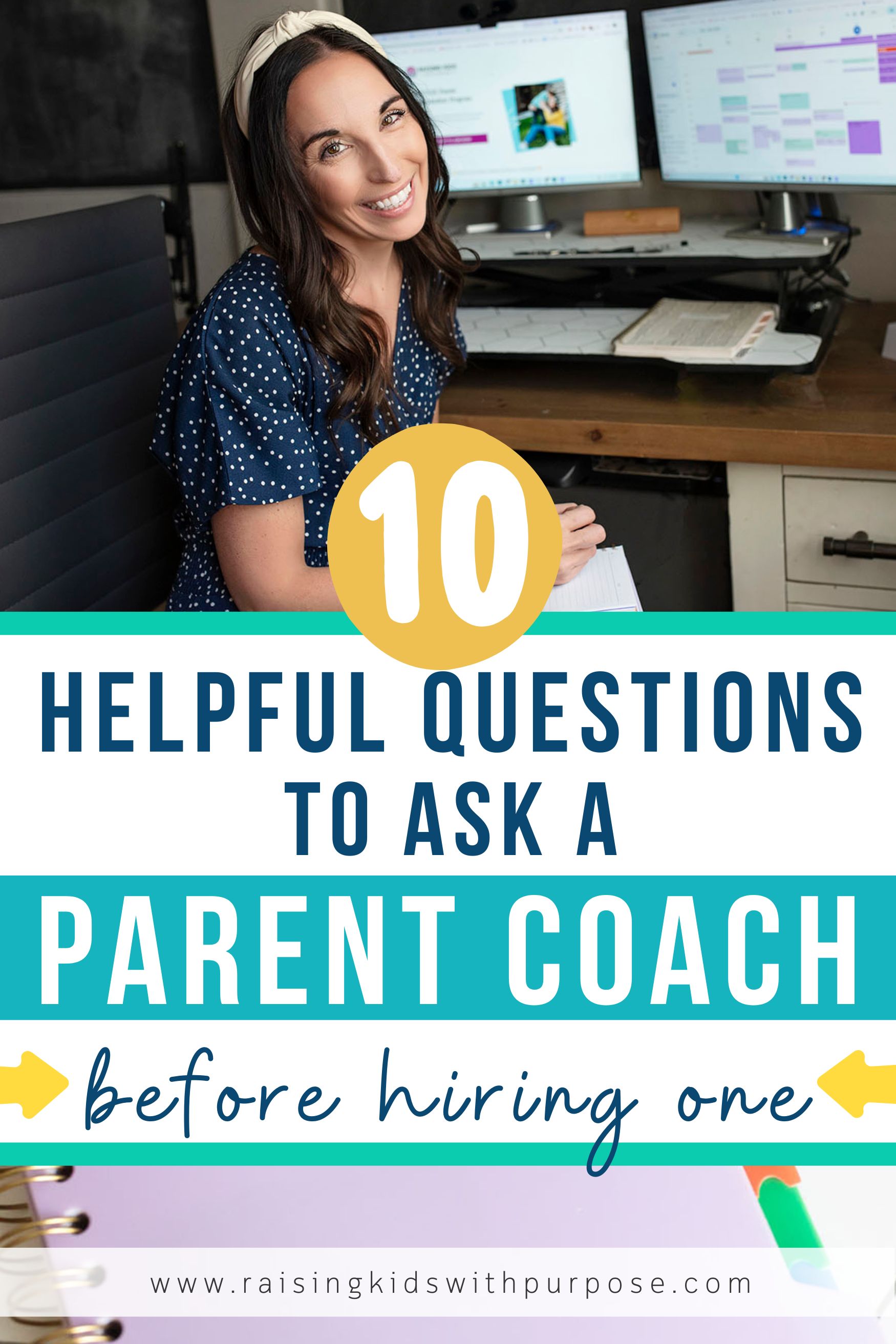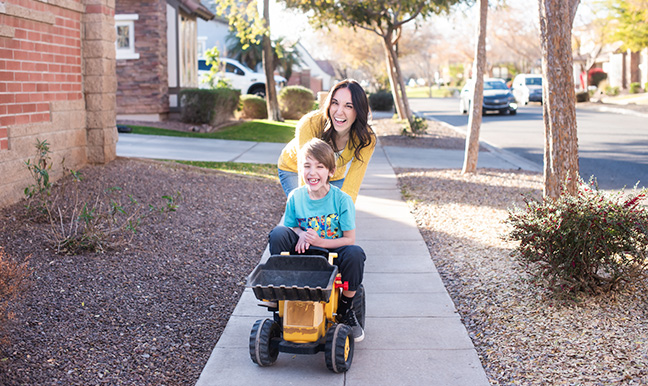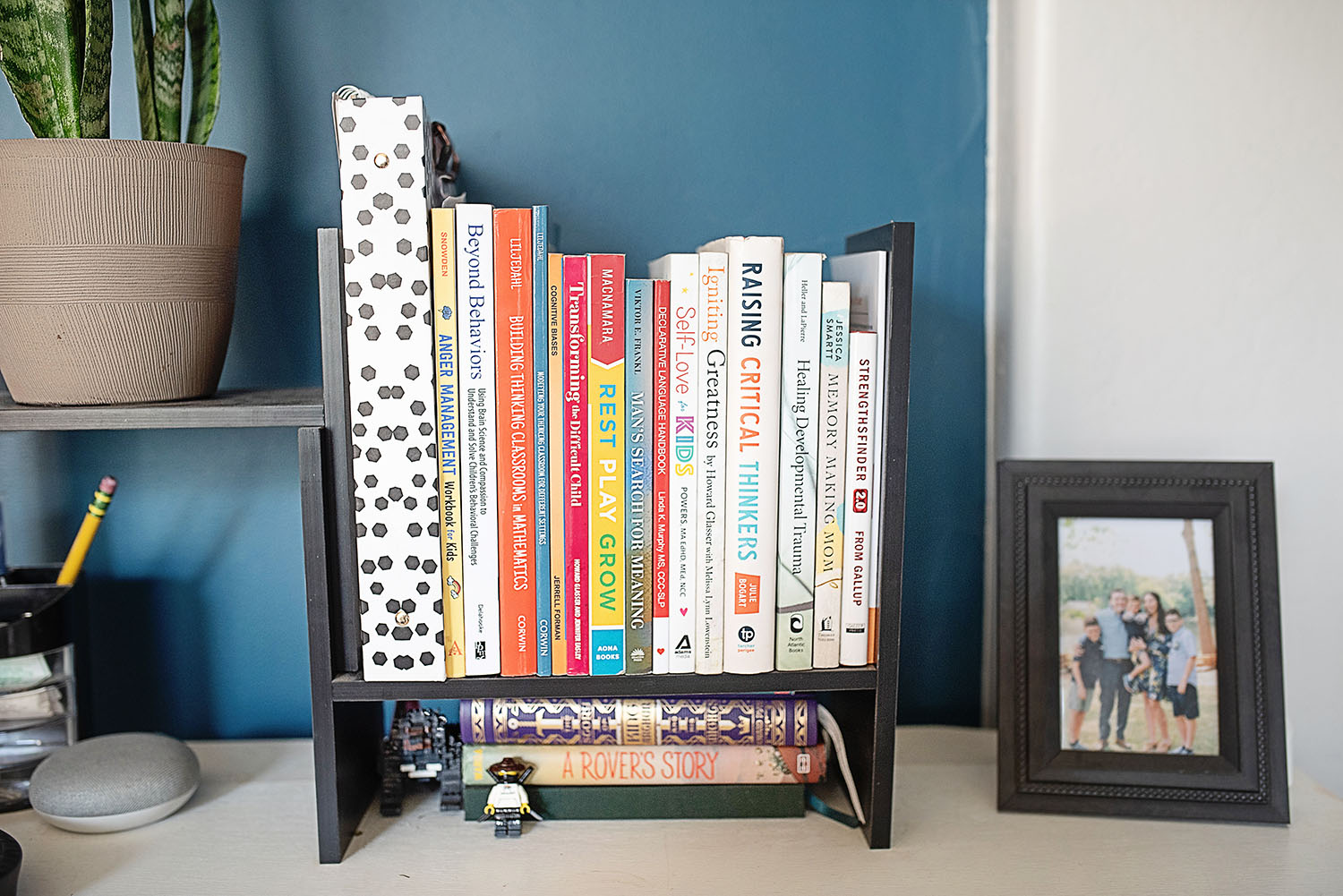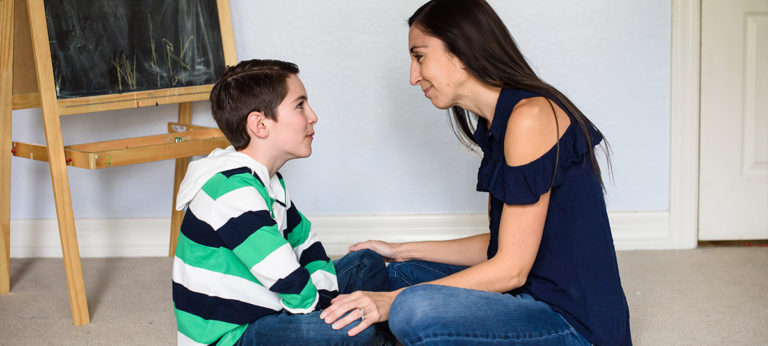10 Helpful Questions to Ask a Parent Coach Before You Hire One
Before you commit, here are the top questions to ask a parent coach to make sure they’re the right fit for your family. This guide will help you feel confident, informed, and empowered every step of the way.
Parenting is one of the most important (and challenging) jobs in the world.
Something I hear all the time is that parenting doesn’t come with a manual or any formal training, but it should!
Amen to that sentiment!
In order to become an engineer, teacher, lawyer, or most professions that require a lot of knowledge, skill, and practice, a degree is required. And yet, adults are able to have babies that are 100% dependent on that adult to have the knowledge and skill to raise them, but most of those people only have the experience of being parented themselves.
As parents, we are expected to raise kind, resilient, emotionally intelligent humans while juggling work, relationships, and our own well-being. While also knowing exactly what to do when the meltdowns, power struggles, or bedtime battles show up.

For many parents, the way they were raised doesn’t feel like the blueprint they want to follow, and oftentimes, how they were parented may have unintentionally caused more harm than good.
This isn’t about blaming or shaming past generations. Instead, it’s about recognizing that we now have powerful insights into child development that simply weren’t available before. And with that knowledge, we have such a gift to give to our children that will impact generations to come.
It’s no wonder more families are turning to parent coaching.
Whether you’re navigating a tough season, raising a neurodivergent child, or just feeling overwhelmed by the daily to-do’s, coaching offers something different: practical tools, personalized support, and a deeper sense of connection, both with your child and yourself.
Coaching provides a pathway to a deeper connection with your child and yourself. Through guided inner work, parents begin to shift long-standing patterns, make real behavior changes, and even rewire their brains. Reading a parenting book or two won’t lead to this kind of transformation.
I recently sat down to talk all about the blueprint I’ve created that can essentially be used as that parenting manual we all wish we had with Alicia Hill on the Faith and Family Trailblazers podcast.
You can also listen to the episode on Apple Podcasts
Before you hire a coach, it’s important to ask questions to a parent coach that help you figure out if it’s a good fit. We are going to walk through 10 helpful questions to ask a parent coach to help you find the support that truly fits your family. But first, let’s address why someone would even want to hire a coach versus trying to figure all this parenting stuff out on their own.
Table of Contents
Why Hiring a Parent Coach Is a Game-Changer
Support, Not Shame
Parent coaching isn’t about pointing out everything you’re doing wrong or giving you a checklist to follow perfectly. It’s about offering real support and empowering you to show up with more confidence, clarity, and connection.
The focus is on GROWTH!
Not living in shame or guilt for what you’ve done or how you’ve parented in the past. A parent coach helps you tune in to what’s beneath the surface of your own behaviors (typically a reaction to your child’s behaviors) and gives you the tools to respond with intention. This, in turn, leads to better behavior for the child and a stronger relationship built on trust instead of fear.
Related: The Real Reason Parenting is Hard and How to Make It Easier

It’s Not About Fixing Your Child
Most parents come to coaching thinking the goal is to change their child’s behavior. But the real magic happens when we shift the focus inward.
One parent recently told me, “I thought I needed help managing tantrums, but I ended up learning how to regulate my own nervous system and reconnect with my child in a way I never had before.”

Another family who is ten weeks into my coaching program recently had a huge epiphany that has not only improved the mom’s own mental health, but has transformed her relationship with her 16-year-old son.
I’m paraphrasing, but she shared, “I’m starting to understand that his choices, like smoking weed, aren’t mine to control. That’s not my responsibility if he smokes weed or not. My responsibility is to create clear boundaries, offer consistent support, and build the kind of relationship that makes him not want to turn to those things in the first place.”
Her very first call to me was filled with panic, fear, and anxiety about the choices her son had been making. She and her husband were doing their best, but the only tools they had (and were being told to use by a psychiatrist with a behavioristic approach) were unintentionally driving a wedge between them and their son, and they were terrified they were going to lose him.
Through parent coaching, they realized that disconnection was the last thing they wanted. They care deeply about their kids, and in just 10 weeks, they’ve grown tremendously, and so has their relationship. By week four, they told me, “We got our son back!”
Now, they feel more confident in what to say, how to respond, and how to keep building a strong, connected foundation, not just with their son, but with their adult daughter who lives with them as well.
The truth is, when we better understand our own triggers, patterns, and needs, we create space for our kids to thrive. It’s not about fixing your child. It’s about healing the patterns that keep us stuck and building a new foundation of trust and connection.
Purpose, Connection, and Growth
These are the pillars of transformational parenting. Coaching helps you clarify your values, strengthen the relationship with your child, and grow in your ability to handle challenges with calm and confidence. These themes are at the heart of my parent coaching approach, and they’re what I share more about in the podcast I mentioned above: Your Parenting Blueprint: Purpose, Connection & Growth.
Personalized Guidance vs. Generic Advice
There’s no shortage of parenting books or tips on Instagram or TikTok, but most of it is one-size-fits-all.
I have a secret: you are unique and have your own wants, needs, desires, and history, and each of your kids is unique in that sense, too!
This is why a lot of traditional advice “doesn’t work.”
What makes coaching different is how personalized it is. Your family’s challenges, your child’s unique needs, and your parenting style are all taken into account. There is no perfect parenting or one answer to every situation. It’s simply not how humans work. Thanks to our Creator!
Together, we create a plan that’s specific to you. It’s not about more information, although there is a lot of that; at the heart of parent coaching is transformation.

10 Helpful Questions to Ask A Parent Coach
Before investing in any parent coaching program, it’s important to make sure the coach aligns with your values, understands your unique challenges, and offers the kind of support that fits your family. These 10 helpful questions to ask a parent coach that will help you confidently choose the right guide for your parenting journey.
1. What is your coaching philosophy and approach?
Why it matters: A coach’s philosophy sets the tone for everything you’ll experience during your time together. You want to be sure their approach aligns with your values and feels right for your family. Some coaches focus on compliance and discipline with an approach rooted in behaviorism (which was highly recommended in the past but has now been proven to be outdated and unhelpful in raising kids) while others prioritize connection, regulation, and emotional intelligence with an approach rooted in interpersonal neurobiology, behavioral psychology, and modern-day neuroscience.
Understanding their core beliefs helps you determine if you’ll feel supported and safe in the coaching relationship.
What to look for: Look for a coach whose philosophy centers around connection-based, neurodevelopmental, or conscious parenting approaches. These frameworks prioritize long-term emotional health and relational safety over short-term behavior control. The right coach should be able to explain their approach clearly and with conviction, in a way that resonates with your goals for your family.
2. What kind of training or certifications do you have?
Why it matters: Parenting is deeply personal, but it also intersects with psychology, neuroscience, and child development. A trained coach brings more than lived experience; they bring a solid, research-backed foundation that can make a lasting impact.
Knowing a coach’s credentials helps you trust their methods and ensures you’re receiving guidance that’s informed by proven strategies.
What to look for: Ask about specific certifications or programs they’ve completed, such as training from the Jai Institute for Parenting, PCI (Parent Coaching Institute), or trauma-informed care programs. Bonus if they also pursue ongoing education or supervision, which shows commitment to growth and integrity in their practice.
Read Next: Parent Coaching: What to Do When Parenting Is Overwhelming

3. Who do you typically work with?
Why it matters: Coaching isn’t one-size-fits-all. Some coaches specialize in toddlers and preschoolers, while others work best with teens, neurodivergent children, or families navigating specific challenges. Some parent coaches specialize in blended families or single parenting.
When a coach has experience with families like yours, they’re more likely to understand the nuances of your situation.
What to look for: Find someone who regularly supports parents with children in similar stages or with similar needs to your own. If your child is autistic, highly sensitive, hyperactive, or strong-willed, for example, you’ll want a coach who not only understands those traits but also respects and embraces them.
Recommended Resource! The Jai Parent Coach Directory has hundreds of parent coaches that specialize in all certain areas of parenting, such as the age and stages of the children, military families, BIPOC families, special needs, divorced/single parents, and more.
4. What outcomes can I expect from working with you?
Why it matters: Setting clear expectations from the start helps avoid frustration and ensures you know what you’re working toward.
Coaching is a powerful tool, but it’s not a magic wand.
Understanding the kinds of transformations other families have experienced will help you see what’s possible and decide if that’s the direction you want to go.
What to look for: Listen for outcomes like fewer power struggles, increased cooperation, better emotional regulation (for both parent and child), stronger communication, and a more peaceful home. If a coach promises to “fix” your child, that’s a red flag. Instead, look for someone who empowers you to create change through relational, developmental strategies.
5. What does the structure of your coaching program look like?
Why it matters: Knowing how a coaching program is structured helps you prepare mentally, emotionally, and logistically. It gives you insight into what’s expected, what’s included, and how the transformation unfolds over time. This also helps you determine whether it fits into your life.
What to look for: Ask about the length of the program, how often you’ll meet, if you meet live or if everything is self-paced online, and what kind of support is included between sessions.
Does the parent coach offer 1:1 coaching, group options, Voxer or email support, or downloadable materials?
Understanding the full scope helps you make a commitment with confidence.

6. How do you tailor your guidance to my family’s unique needs?
Why it matters: No two families (or children) are alike. Cookie-cutter advice might sound good on paper, but it rarely works in real life. You deserve support that reflects your family values, your parenting choices, and your child’s specific developmental profile.
What to look for: Seek out a coach who asks thoughtful questions about your family, observes patterns, and adapts their tools to fit your unique situation. Personalized plans, targeted resources, and responsive coaching are signs you’re getting more than a pre-written script. You are investing in getting the care and collaboration you need and want in a parent coaching program.
7. What is your experience with kids like mine?
Why it matters: Parenting strategies that work for one child might backfire with another, especially when a child has ADHD, autism, is gifted, has experienced trauma, or has other unique needs.
Experience builds understanding, and understanding builds trust.
What to look for: You want a coach who has both personal and/or professional experience with children like yours, and who can speak to it without judgment or labels. Ask how they’ve supported similar families and what they’ve learned along the way. You’ll gain insight into how well they’ll understand and advocate for your child.

8. How do you involve both parents or other caregivers?
Why it matters: When caregivers are on the same page, children feel safer and more secure. A coach who understands family systems will prioritize unity and open communication across the parenting team.
What to look for: Look for a coach who offers ways to involve partners or co-parents, even if they can’t attend every session. They might offer joint calls, shared resources, recording the live coaching sessions or specific strategies for building a united front without pressure or blame.
9. What support is available between sessions?
Why it matters: Most of parenting happens between sessions, such as during the after-school madness, bedtime struggles, and sibling fights. That’s when you’ll need quick reminders, encouragement, or help applying what you’ve learned.
What to look for: Find out if the coach offers in-between support like Voxer access, email check-ins, or a private community. These touchpoints can make all the difference in staying consistent, feeling supported, and keeping momentum throughout your journey.

10. How will we track progress and celebrate wins?
Why it matters: Parenting growth can feel slow at first, and it’s easy to miss how far you’ve come. A good coach helps you track progress, reflect on growth, and celebrate the small (but significant) wins that create lasting change.
What to look for: Ask how they measure progress, whether it’s through journaling, reflection prompts, family check-ins, or even looking back at what life was like a month ago. A coach who helps you celebrate along the way builds your confidence and makes the journey more motivating and rewarding.
What to Do After You’ve Asked the Questions
Once you’ve asked the right questions to a parent coach, pause and reflect, not just on the answers, but on how the conversation felt.
Did you feel seen and heard?
Did the coach seem genuinely curious about your family and invested in your goals?
Emotional connection and trust are just as important as credentials.
You’re inviting someone into your parenting journey, and that relationship should feel safe, supportive, and aligned.
Don’t feel pressured to make a decision on the spot. Take time to compare your options and sit with what each parent coach offered. This isn’t about choosing the most impressive résumé, it’s about choosing someone who truly gets you and your child and who you think you can trust to guide you on this process.
If you’re still unsure, schedule a discovery call. Most coaches offer a free or low-cost introductory session where you can ask questions to the parent coach, share a bit about your family, and get a feel for what working together would be like. It’s a great way to test the waters before making a commitment, and it might just be the conversation that changes everything, like it was for the mom I mentioned above.

Raising Kids With Purpose – My Approach to Parent Coaching
If you’re curious how I’d answer these helpful questions, here’s what it looks like to work with me:
- My Coaching Philosophy & Approach:
I use a connection-based, neurodevelopmentally informed approach rooted in modern research in brain science and neuropsychology. My work helps parents shift from behavior management to understanding the “why” behind behaviors, so you can respond with confidence, not control. - My Training & Background:
I’m a certified Parenting Coach through the Jai Institute for Parenting, where I was trained in brain science, attachment theory, emotional intelligence, and connection-based discipline. Before launching my own coaching practice, I spent four years at Prenda, an innovative education company that supports microschools. During that time, I co-hosted a podcast called KindlED, which focused on helping parents and educators support the whole child. I had the privilege of visiting over 100 microschools, witnessing firsthand how relationship-based tools empower kids to learn, grow, and become kind, capable humans. - Who I Typically Work With:
I specialize in working with parents of neurodivergent, highly emotional, or strong-willed kids, especially those with ADHD, anxiety, autism, or sensory challenges, or kids who have hard behaviors and big emotions. Most are ages 2–16, but I also support parents of young adults. - What You Can Expect to Learn:
In the P.U.R.P.O.S.E. Parent Transformation Program, I teach emotional regulation, co-regulation, boundaries rooted in connection, nervous system literacy, behavior decoding, and practical parenting tools based on neuroscience and child development. - Structure of My Coaching Program:
I offer both 1:1 and group coaching options. The full program is 12 weeks, with weekly calls, downloadable workbooks, videos, an online course, and guided exercises. Voxer or email support is included, depending on your package. - How I Personalize Support:
Every family is unique. I begin with a full intake form and a P.U.R.P.O.S.E. Deep Dive Assessment. From there, we co-create a plan that works for your specific challenges, needs, and goals. No cookie-cutter solutions here. - My Personal Experience:
I’m raising three twice-exceptional (2e) boys with a mix of ADHD, autism, anxiety, giftedness, and OCD. I’ve lived through the meltdowns, the screen-time battles, and the big emotions, including anger and violence. I bring that lived experience with compassion and zero judgment. - Involving Both Parents:
I strongly encourage both parents (or any caregivers) to participate. I offer tools for creating a shared parenting vision and navigating different styles with respect. If only one parent can attend, I’ll support you in bringing the other along with what you learn. - Support Between Sessions:
You’ll never feel alone. I offer voice/text support via Voxer or email, depending on your package. You’ll also have access to reflection tools, reminders, and resources to help you apply what we cover each week. - Tracking Progress & Celebrating Wins:
We use reflection questions and live check-ins throughout the 12 weeks. I help you notice the small, meaningful shifts and celebrate every win—because those are what build lasting change.
Read Next: To The Mom of “That Kid” Who Is Seen For His Behavior (Instead of His Character)
Conclusion
You don’t need to have it all figured out before asking for help. That’s exactly what coaching is for, to walk alongside you as you learn, grow, and create the kind of family culture you truly want. Parenting is a journey, and you were never meant to do it alone.

Ready to explore coaching?
Let’s talk about your family’s needs and see if the P.U.R.P.O.S.E. Parent Transformation Program is right for you.
- Find a time to meet with Adriane for a complimentary coaching call
- Looking for more tools to help you parent with intention? Grab my free How to Raise Kids With Purpose Guide, a powerful resource to help you connect, guide, and grow alongside your kids.
- Learn more about how to work with Adriane
You’re already showing up with purpose, and that’s the first step to being the parent your kids need 💛.








